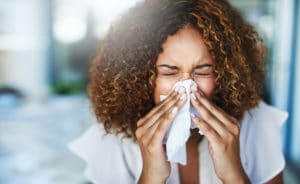 Not only do they give you the willies, cockroaches can cause serious health problems. The saliva, feces and shedding body parts from cockroaches trigger allergies and asthma for many Americans, especially children. In fact, up to 60 percent of people who live in cities are allergic to cockroaches, which are found in an estimated 78 to 98 percent of urban homes.
Not only do they give you the willies, cockroaches can cause serious health problems. The saliva, feces and shedding body parts from cockroaches trigger allergies and asthma for many Americans, especially children. In fact, up to 60 percent of people who live in cities are allergic to cockroaches, which are found in an estimated 78 to 98 percent of urban homes.
Symptoms include a chronically stuffy nose, frequent ear and sinus infections, itchy eyes and nose, cough that doesn’t go away, shortness of breath, wheezing, rashes and chest tightness. While these symptoms can appear with seasonal allergies, cockroach allergy symptoms will be chronic.
You should see an allergist for a skin test to confirm a cockroach allergy. A skin test involves applying a diluted allergen to the surface of your skin, waiting about 15 minutes, then observing to see if there’s a reaction such as a raised, red and itchy bump. If a reaction develops, your doctor may recommend or prescribe allergy medications or shots. Allergy shots will help your body become less sensitive to specific allergens such as cockroaches.
In addition to treating your cockroach allergy with medication, you should also remove anything in your house that invites these little critters to stay with you in order to make your home a cockroach-free environment. Cockroach prevention includes:
- Keeping the kitchen clean and free of open food. This will cut off their food source.
- Vacuum regularly. A vacuum with a HEPA filter will remove cockroach allergens as well as things they eat such as human and pet dander.
- Fix any water leaks. These give cockroaches access to water.
- Avoid piles of dishes, newspapers and laundry as these will all attract cockroaches.
Since cockroaches are very good at hiding, you may need to seek the assistance of a professional pest remover. They can help you kick the little critters out of your home for good.
“Dr. Strand is wonderful. In fact, all the staff are just the best. Personable, and to the point. You will be well cared for at Willamette ENT.”